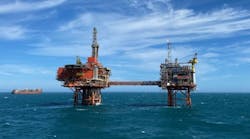The difficulties facing the oil and gas industry in the North Sea are significant. After several years of relative stability which followed the 2008 global economic crisis, the price of oil has been falling for 18 months, reaching an historic recent low of sub-$35/bbl earlier this year. Today’s low barrel price environment is forcing operators to find cost and operational efficiencies to survive, let alone thrive, and in a mature field like the North Sea, the challenge is even greater.
Within this context, the North Sea in particular, as a mature oil basin, is seen by many operators as having a limited future. Despite the efforts of some local governments to support producers in the region by lowering taxes for instance, the task of physically finding oil in the North Sea is becoming more and more difficult and, when it is found, the pockets of oil are more widely dispersed. Fields are maturing and producers are being pushed to be more efficient and find new ways to squeeze more barrels out.
Yet it is not all doom and gloom. Estimates suggest there are around 26-38 Bbbl still to extract, which points to significant potential left in the North Sea. What’s more the region still remains vital to energy supply in Europe and globally; not only to drive forward innovation and investment in the basin but also to ensure that oil supply is not limited to more volatile regions in the world.
So, as operators respond to this environment and look to improve cost and operational efficiencies, the author believes that there are interesting opportunities to use in the current situation to our advantage.
The difficult environment gives the industry a strong impetus to develop more long-term plans. In particular, it shows that there is a clear need for industry to evolve its working practices to become more robust for the future. And the author believes technology plays a key role in helping us to become more sustainable as an industry, while exploring new ways of improving cost and operational efficiency.
Developing smart and innovative ways to overcome the challenges presented by the North Sea’s geology has been the defining feature of Maersk Oil’s operations in the North Sea for the past decades. The company has been working on developing new technologies in key areas that will provide real workable solutions for its operations and the industry more widely.
A particularly exciting technique the company is working on is low salinity water injection. It can prove a really effective and low cost technology that allows us to enhance oil recovery without the high costs often attached to other EOR methods. In recent tests, this technology enhanced oil recoveries by 5-15% by changing the wettability of the reservoir rock, freeing the oil molecules stuck on the surface of the rock. This is just on lab level, but the company is excited to see the impact this will have in the field.
Success lies in improving efficiency in every step of the oil recovery roadmap by synchronizing diverse measurements, applying advanced technologies, and integrating knowledge across multiple domains. We are continuing to develop promising mechanisms but getting a particular mechanism ready for implementation on large scale production takes several years - so it is still early days.
Our innovation and research show that there is a positive side to the current low price environment. The industry is being forced to plan for a time when oil recovery is going to become more and more difficult - think of it like a test run for keeping the industry afloat in the years to come - and in doing so we are seeing engineering in the sector take a big leap forward to protect and make the most of the potential left in the North Sea.
If we think more long-term and look at Maersk Oil’s major recent North Sea discoveries such as Culzean and Johan Sverdrup, and the fact that globally oil demand is growing, it becomes even more evident why the industry should not turn its back on the North Sea. Instead, it should treat the current situation as an important lesson that will help the industry become much more technologically agile and resilient in the future.
Troels Albrechtsen
Head of Corporate Technology and Projects
Maersk Oil




